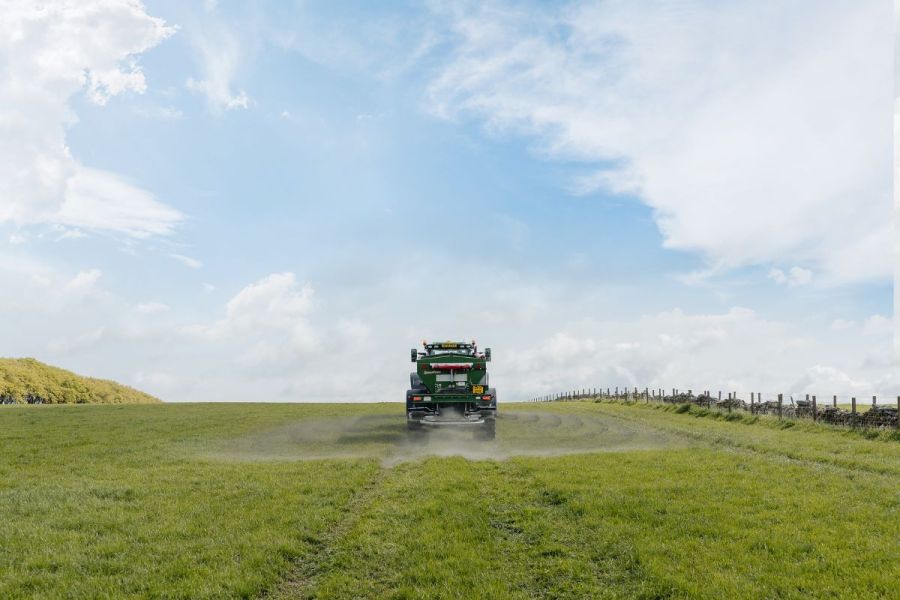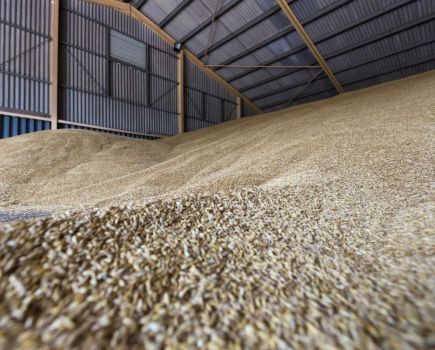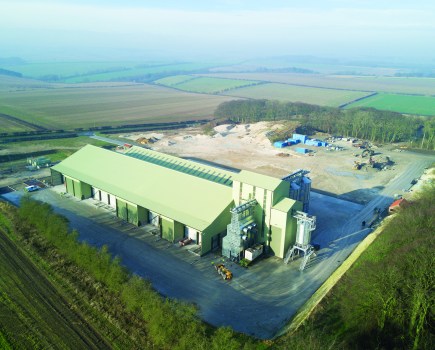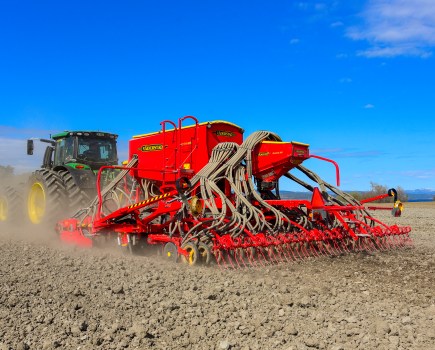What’s the result when combining a carbon removal specialist with a Scottish agricultural contractor, a fleet of Fendt tractors and a ready supply of volcanic rock? The answer is, a new way to create carbon credits. CPM finds out more.
“With millions of hectares of land and millions of tonnes of basalt, there’s seemingly no limit.”
By Melanie Jenkins
More than 90 percent of the world’s volcanic rock is basalt, making it easy to find when mining in areas with current or historic volcanic activity. Rich seams of basalt exist in the UK and carbon removal company Undo has been collecting it from mines and quarries to use on farmland.
“Basalt is an existing aggregate product of many UK mining operations which has agronomic value because it contains potassium, calcium, magnesium, sodium and sulphur that act as a soil conditioner,” explains Undo’s Joe Ritchie.
A Sheffield University study has established that at least six nutrients in basalt are essential for plant growth. According to another 2020 study that tested the effect of crushed basalt on sorghum trial plots, it increases yields by up to 20% without the use of phosphate and potassium fertilisers.
Furthermore, Sheffield University and others worldwide agree that basalt has carbon-fixing properties. This has led Undo to partner with mines and agricultural contractors to apply basalt to fields in the UK through a process known as enhanced rock weathering (ERW).
“ERW is a carbon dioxide removal technique which is already removing tens of thousands of tonnes of CO2 from the world’s atmosphere,” says Joe.
For the farmer, Undo supplies the basalt free of charge by working with local, trusted contractors, which has the added benefit of creating jobs in rural communities. “This gives the farm the nutrient value of the basalt and the contractor an income for spreading it. When the operational data is harvested it’s used to create carbon credits,” he adds.
Undo then sells these credits to clients such as Microsoft, British Airways and McLaren, which helps to offset the carbon generated by these businesses’ operations and enables each to move closer to net zero.
By using ERW, Undo removes 1t/CO₂ for every 4t of basalt applied to agricultural land at a concentration of 20t/ha. “This geological process has happened naturally for millions of years. However, mining basalt from the ground, grinding it to almost a powder less than 4mm in diameter to be precise, and applying large quantities to agricultural land, has simply accelerated this process,” explains Joe.
Undo collects a lot of data to generate carbon credits. A custom-built data platform named Newton houses rock mineralogy data tied to the location of each spreading job. This allows for a single tonne of CO₂ removed to be tracked back to a specific rock type spread on a specific field, providing 100% traceability.
Crucially, Fendt’s FendtOne system tracks the tractors’ fuel use for each spreading task, allowing Undo to subtract the carbon emitted during the collection and spreading of the basalt.
Contractor Robert Hamilton was approached by Undo to apply basalt in Scotland from his base just south of Glasgow. The firm supplied the basalt and he was willing to invest in the AgriSpread machines required to spread it with his incumbent fleet of Fendt 700 series tractors. The partnership had the hardware, but as with most endeavours, the devil was in the detail.
“Spreading the basalt was a relatively easy task, no more difficult than lime and recording how much had been spread was equally easy. However, equating that data to the distance travelled, combined with how much fuel was used and the quantity of basalt being applied, was harder,” explains Robert.
Fendt launched FendtOne as a new way for tractors to share data. Although in its relative infancy, it has the capacity to share fuel, time, quantity of product applied by an Isobus implement, and the size of area that received it.
“It can record everything in real time without additional software or hardware like memory sticks. It provides everything Undo requires to create a carbon credit, so all we have to do is set up the job for the tractor and FendtOne records the job,” he says.
Questions may arise regarding whether this is possible with any tractor. Robert says possibly, but data is a fickle thing and often difficult to share and interpret accurately. Fendt was not only able to offer Undo the data it required from Robert’s exploits across Scotland, but it also found a way to enable his whole fleet.
“Any Fendt 500 series, or larger tractor fitted with the 10.4-inch screen and Fendt’s VarioDoc system, can be upgraded to provide the same information, in the same way as a new tractor operating with FendtOne. I have updated S4 generation 700 series ProfiPlus tractors that had the optional screen factory-fitted and are compatible with the new software,” says Robert.
The tractors were all fitted with a sim card, the same as those used for a sim-only phone contract, and instantly became data sharers. Fendt also required a software license fee of approximately £100 per unit to enable the older tractors to be added to FendtOne and become capable of performing the same job.
“At least one Fendt in the fleet must be a newer model manufactured with FendtOne inbuilt in order for the owner to have an account, but I already had two Gen 6 724 ProfiPlus models so one of them became the lead tractor,” he explains.
By converting four older 724 S4 models he was able to commit tractors with higher hours and less power to the spreading work, which reduced his cost per hour and freed up his newer tractors for more demanding work.
In year one (2022), a mere 10,000t of basalt was spread by Undo, at which time it was possible for the firm’s team to grapple with memory sticks and various different file types to record the data they required to prove carbon credits were being created.
In 2023, this rose to 128,000t. This increase was, in part, due to having more tractors on the ground that could share data faster using FendtOne.
“Downloading files from USB sticks and uploading BIN files, variable rate maps and spread rates, was clunky and inefficient. Now, all the data is sent in real time from the tractor using FendtOne, and Fendt will soon offer CSV files that can be downloaded from the system to enable immediate data export to other applications,” says Joe.
“With millions of hectares of land and millions of tonnes of basalt, there’s seemingly no limit to the technique Undo has created and no feasible reason not to max out the application of basalt worldwide,” he adds.
However, it’s important to note that the mineralogical composition of the basalt has to be established before it’s ground and spread. Undo tests the feedstocks from each of its sources every 3000t to ensure the safety of the material and provide valuable data to determine how fast the rock will weather.
This sampling has the added agricultural benefit of offering the farmer or agronomist the amount of potassium, calcium, magnesium, sodium and sulphur present in the basalt being spread.
“The calculation of how much carbon is being sequestered from the process is an equally complex process. Grinding the rock makes it more effective at capturing carbon as its increased surface area catalyses the chemical reactions between it and the CO₂ in rainfall.
“It’s ground to 1-4mm and geological makeup is analysed and correlated with global climate, weather and rainfall. This is then used in conjunction with spreading data to supply the necessary information for our carbon credits,” explains Joe.
And because the process isn’t simple, Undo developed the Newton data platform to manage operational and scientific data. FendtOne is then required to provide Newton with data for every second a tractor is operating and the quantity of basalt it’s applied.
A unique inventory management system (IMS) is subsequently used to generate the projected carbon credits based on the pooling of all the information relating to each tonne of basalt. This includes information about the quarry, the rock sample, haulage, spreading location, hours, fuel use and more.
“Only by using this can we provide the data in a cost-effective and time efficient way. And this is crucial to scaling the model. Automating the entire process has been business-critical and now we have the capacity to process millions of tonnes of basalt accurately using our own software and FendtOne,” concludes Joe.
This article was taken from the latest issue of CPM. Read the article in full here.
For more articles like this, subscribe here.
Sign up for Crop Production Magazine’s FREE e-newsletter here.




